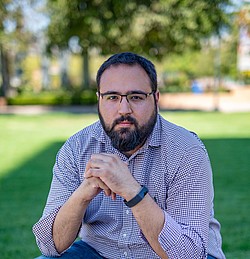Vagelis Papalexakis
Title
Tensor Decompositions for Graph Mining, Gravitational Wave Detection, and Adversarial Machine Learning
Abstract
Tensor decompositions have been very popular and effective tools for analyzing multi-aspect data in a wide variety of fields, ranging from Psychology to Chemometrics, and from Signal Processing to Data Mining and Machine Learning.
In this talk, we will explore the effectiveness of tensor decompositions as data analytic tools in a variety of exciting, real-world applications:
Graph Mining, where we demonstrate how tensor decomposition can identify communities and their rich structure in graphs, both in unsupervised and semi-supervised settings, in static and dynamic cases, exploring novel problems of concept drift;
Gravitational Wave Detection, where we tackle the problem of glitches in the LIGO detectors, exploring the problem from a semi-supervised label-scarce scenario, towards improving the ability to detect and analyze gravitational waves; and
Adversarial Machine Learning, where we explore recent adversarial attacks in state-of-the-art deep learning models (Graph Convolutional Neural Networks and Convolutional Neural Networks), identify unifying patterns in those attacks, and devise effective defenses based on low-rank tensor decomposition.
About the Speaker
https://www.cs.ucr.edu/~epapalex/
Evangelos Papalexakis is an Assistant Professor of the CSE Dept. at University of California Riverside. He received his PhD degree at the School of Computer Science at Carnegie Mellon University (CMU). Prior to CMU, he obtained his Diploma and MSc in Electronic & Computer Engineering at the Technical University of Crete, in Greece.
Broadly, his research interests span the fields of Data Science, Machine Learning, Artificial Intelligence, and Signal Processing. His research involves designing interpretable models and scalable algorithms for extracting knowledge from large multi-aspect datasets, with specific emphasis on tensor factorization models, and applying those algorithms to a variety of real world problems, including detection of misinformation on the Web, explainable AI, and gravitational wave detection.
His work has appeared in top-tier scientific venues and has attracted a number of distinctions, including best student paper award at PAKDD’14 and SDM’16. He was a finalist for the Microsoft PhD Fellowship and the Facebook PhD Fellowship. Besides his academic experience, he has industrial research experience working at Microsoft Research Silicon Valley during the summers of 2013 and 2014 and Google Research during the summer of 2015. He has been named as one of the "2016 KDD Rising Stars" by Microsoft Academic Search, and his doctoral dissertation received the 2017 SIGKDD Doctoral Dissertation Award (runner up).





